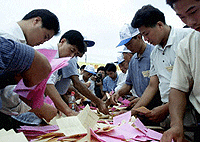Grassroots Politics in China
Thankfully, Michael Harvey, who teaches in Abu Dhabi. reads the Boston Globe. That's one of the news sources I don't usually get to, yet there are valuable articles that appear there. The story excerpted below is one of those valuable ones.You could use it to discuss the emergence of civil society and independent political activity in China.
(Note that the activists described here would find themselves in re-education prisons very quickly if they were associated with an organized group. As long as they appear to be independent actors, they will "merely" be harassed and occasionally jailed. A Sun Yat-sen university professor is quoted in the article as saying that independents "are considered by local governments as being connected to subversion, manipulated by foreign forces or driven by ulterior motives...")
This article could also be a superb introduction to a comparative case study. Ask students to compare the candidate selection process in China with the one in Iran. They would have to do some research and they'd have to deal with the standards for a comparative case study, but those things are all wonderful opportunities. (See chapters 1 and 2 of Timothy C. Lim's book Doing Comparative Politics for guidelines on doing a study like this. You can also find Dr. Lim's PowerPoint presentations associated with those chapters online.)
Here are some excerpts from Audra Ang's Associated Press article from 10 November:
Activists challenge communism in China
"Cai Aimin says he was busily handing out homemade leaflets on the streets, campaigning for a seat in his city's legislature, when police officers swooped in and dragged him into an unmarked car. The platform outlined in his handbills called for exposing corrupt officials and protecting citizens from seizures of their property. The police, he said, did not agree...

"In the midst of an election season for local congresses, a tug-of-war is under way across China between social activists demanding a say in local politics and a communist leadership determined to maintain strict limits on the low-level democracy it has promoted for some years.
"The government allows direct elections of the largely powerless district legislatures and seems to be holding the upper hand over candidates it doesn't like...
"'I want to see freedom and democracy,' Wen Yan [a campaigner against soaring property prices in the southern city of Shenzhen] said in a telephone interview. 'But I was harassed by people from the community where I was living. They followed me and took back the leaflets and T-shirts I had distributed.'
"Despite the setbacks, the elections underscore a slow shift in China as people, given greater mobility and prosperity by free-market reforms, are challenging the Communist Party's political monopoly.
"The party has the power to harass candidates off the ballots, 'but the more significant point here is that it has to do this at all,' Bruce Gilley, a China politics expert at Canada's Queens University, said in an e-mail...
"The Communist Party dominates the congresses, controlling the credentials committees that vet candidates while trumpeting the system in state media as Chinese-style democracy. More than 2 million deputies are being elected to local People's Congresses over an 18-month period lasting until Dec. 31, 2007, according to the official Xinhua News Agency..."



1 Comments:
The Economist has more information on the local elections in China.
Elections in China: No contest -- The party still fears the voter
"GRASSROOTS democracy in China, which began to show faint signs of life three years ago, is struggling...
"In 2003 elections to district people's congresses, the lowest legislative tier in urban China, inspired a glimmer of hope that the Communist Party was ready to relax its tight control of these rubber-stamp bodies...
"If allowed to flourish, this experiment could have been important... But this year the mood has been very different...
"Outside Beijing, the authorities in some areas appear to have gone to greater lengths to discourage independent candidates...
"Political reform is still officially on the party's agenda. A Central Committee resolution last month called for an expansion of grassroots democracy, as well as respect for human rights and greater democracy within the party itself... But there are few signs that President Hu is in a hurry to put his democratic pledges into practice."
Post a Comment
<< Home